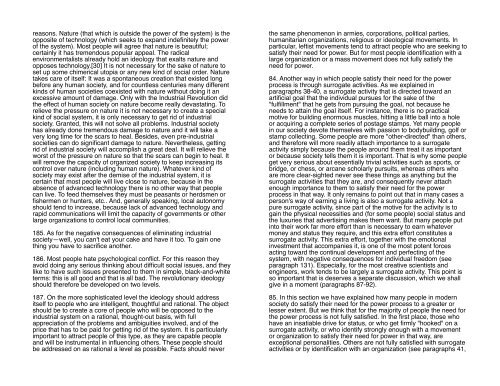Unabomber Manifesto - ouroboros ponderosa
Unabomber Manifesto - ouroboros ponderosa
Unabomber Manifesto - ouroboros ponderosa
Create successful ePaper yourself
Turn your PDF publications into a flip-book with our unique Google optimized e-Paper software.
easons. Nature (that which is outside the power of the system) is theopposite of technology (which seeks to expand indefinitely the powerof the system). Most people will agree that nature is beautiful;certainly it has tremendous popular appeal. The radicalenvironmentalists already hold an ideology that exalts nature andopposes technology.[30] It is not necessary for the sake of nature toset up some chimerical utopia or any new kind of social order. Naturetakes care of itself: It was a spontaneous creation that existed longbefore any human society, and for countless centuries many differentkinds of human societies coexisted with nature without doing it anexcessive amount of damage. Only with the Industrial Revolution didthe effect of human society on nature become really devastating. Torelieve the pressure on nature it is not necessary to create a specialkind of social system, it is only necessary to get rid of industrialsociety. Granted, this will not solve all problems. Industrial societyhas already done tremendous damage to nature and it will take avery long time for the scars to heal. Besides, even pre-industrialsocieties can do significant damage to nature. Nevertheless, gettingrid of industrial society will accomplish a great deal. It will relieve theworst of the pressure on nature so that the scars can begin to heal. Itwill remove the capacity of organized society to keep increasing itscontrol over nature (including human nature). Whatever kind ofsociety may exist after the demise of the industrial system, it iscertain that most people will live close to nature, because in theabsence of advanced technology there is no other way that peoplecan live. To feed themselves they must be peasants or herdsmen orfishermen or hunters, etc.. And, generally speaking, local autonomyshould tend to increase, because lack of advanced technology andrapid communications will limit the capacity of governments or otherlarge organizations to control local communities.185. As for the negative consequences of eliminating industrialsociety—well, you can't eat your cake and have it too. To gain onething you have to sacrifice another.186. Most people hate psychological conflict. For this reason theyavoid doing any serious thinking about difficult social issues, and theylike to have such issues presented to them in simple, black-and-whiteterms: this is all good and that is all bad. The revolutionary ideologyshould therefore be developed on two levels.187. On the more sophisticated level the ideology should addressitself to people who are intelligent, thoughtful and rational. The objectshould be to create a core of people who will be opposed to theindustrial system on a rational, thought-out basis, with fullappreciation of the problems and ambiguities involved, and of theprice that has to be paid for getting rid of the system. It is particularlyimportant to attract people of this type, as they are capable peopleand will be instrumental in influencing others. These people shouldbe addressed on as rational a level as possible. Facts should neverthe same phenomenon in armies, corporations, political parties,humanitarian organizations, religious or ideological movements. Inparticular, leftist movements tend to attract people who are seeking tosatisfy their need for power. But for most people identification with alarge organization or a mass movement does not fully satisfy theneed for power.84. Another way in which people satisfy their need for the powerprocess is through surrogate activities. As we explained inparagraphs 38-40, a surrogate activity that is directed toward anartificial goal that the individual pursues for the sake of the"fulfillment" that he gets from pursuing the goal, not because heneeds to attain the goal itself. For instance, there is no practicalmotive for building enormous muscles, hitting a little ball into a holeor acquiring a complete series of postage stamps. Yet many peoplein our society devote themselves with passion to bodybuilding, golf orstamp collecting. Some people are more "other-directed" than others,and therefore will more readily attach importance to a surrogateactivity simply because the people around them treat it as importantor because society tells them it is important. That is why some peopleget very serious about essentially trivial activities such as sports, orbridge, or chess, or arcane scholarly pursuits, whereas others whoare more clear-sighted never see these things as anything but thesurrogate activities that they are, and consequently never attachenough importance to them to satisfy their need for the powerprocess in that way. It only remains to point out that in many cases aperson's way of earning a living is also a surrogate activity. Not apure surrogate activity, since part of the motive for the activity is togain the physical necessities and (for some people) social status andthe luxuries that advertising makes them want. But many people putinto their work far more effort than is necessary to earn whatevermoney and status they require, and this extra effort constitutes asurrogate activity. This extra effort, together with the emotionalinvestment that accompanies it, is one of the most potent forcesacting toward the continual development and perfecting of thesystem, with negative consequences for individual freedom (seeparagraph 131). Especially, for the most creative scientists andengineers, work tends to be largely a surrogate activity. This point isso important that is deserves a separate discussion, which we shallgive in a moment (paragraphs 87-92).85. In this section we have explained how many people in modernsociety do satisfy their need for the power process to a greater orlesser extent. But we think that for the majority of people the need forthe power process is not fully satisfied. In the first place, those whohave an insatiable drive for status, or who get firmly "hooked" on asurrogate activity, or who identify strongly enough with a movementor organization to satisfy their need for power in that way, areexceptional personalities. Others are not fully satisfied with surrogateactivities or by identification with an organization (see paragraphs 41,






